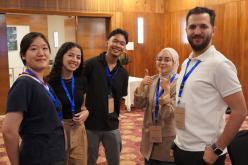International Youth Day is observed annually on 12 August. This year's theme — From Clicks to Progress: Youth Digital Pathways for Sustainable Development underpins the importance of investing in digital innovation. From Lebanon, Libya and Saudi Arabia, here's a look at three UN Volunteers, we call them digital natives — who demonstrate the power of youth while amplifying the need to enhance digital inclusion.
Nesrine Kammourieh is a Digital Communications Associate with the United Nations Educational, Scientific and Cultural Organization (UNESCO) in Lebanon. She manages the organization's social media accounts, creates impactful content and manages the digital campaigns. She also monitors the performance of various digital platforms.
According to the data collected, three-quarters of young people aged 15 to 24 years use the internet worldwide. However, multiple disparities exist regarding unequal access to digital technology especially in low-income countries.

"As a media enthusiast and digital native, I use technology to drive change, create innovative solutions, and advance sustainable development. Working closely with artificial intelligence and using AI-driven analytics, we understand audience behaviour and tailor our content more effectively,” shares Nesrine.
Our generation's strength lies in our creativity, adaptability, and willingness to embrace new technologies. We are shaping the future. Breaking down barriers. Creating innovative solutions to the world's most pressing challenges." -- Nesrine Kammourieh, UN Volunteer Digital Communications Associate with UNESCO, Lebanon.
In Libya, Asim Alaajeeli works on water and sanitation systems in the areas affected by Storm Daniel. As an Emergency Wash Officer with the UN Children's Fund (UNICEF), he prepares technical reports, supports the overall development of the programme and also monitors its resources.
Asim highlights the disparities that exist in digital access, particularly in low-income countries and among young women. He says effective strategies must be implemented to close the digital divide.
Disparities create a digital divide. Low-income countries and young women often lack the resources and skills to participate, hindering innovation and economic growth. By creating economic opportunities, we can enable youth to fully leverage digital technologies for sustainable development." Asim Alaajeeli, Emergency WASH Officer with UNICEF, Libya.
Reema Al Dakheel is a Programme Management Associate with the World Health Organization (WHO) in Oman. Her volunteer assignment is fully funded by Saudi Arabia. Reema develops project plans and uses mobile devices, cloud-based tools, and AI to enhance research, collaboration and data analysis.

Reema uses social media for advocacy and data analytics to monitor progress. She values data-driven policies to effectively accelerate the Sustainable Development Goals, especially SDG 3 —good health and well-being and SDG 4 — quality education.
Young people are creative and possess the digital skills needed to contribute significantly. Young people bring fresh perspectives, energy and drive. They push boundaries to lead future progress on global challenges." Reema Al Dakheel, UN Volunteer Programme Management Associate with WHO, Oman.
More than two-thirds of the United Nations targets for sustainable development can benefit directly from digital technologies. Bridging the digital divide makes it possible for the next generation of digital natives to have the same opportunities and resources, regardless of socioeconomic status or location — in short, an equal world for all.

